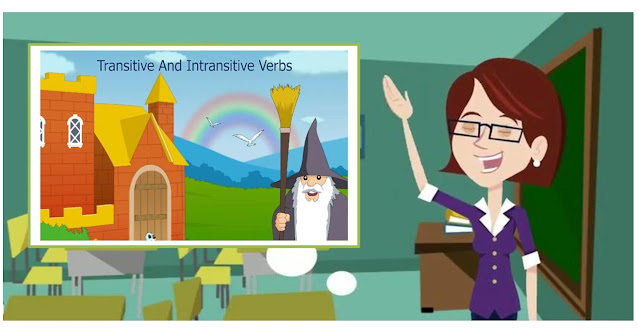Transitive & Intransitive Verbs Subject English Grade VIII
Transitive & Intransitive Verbs
Subject English
Grade VIII
- Principal verbs are two types:
- Transitive Verb: as;
- We eat rice.
- He does his homework.
- Intransitive Verb: as;
- River flows.
- Winds blow.
- Birds fly.
- Animals die.
- A verb is Transitive if the action does not stop with the agent, but passes from the agent to something else.
- A verb is Intransitive when the action stops with the agent, and doesn`t passes from the agent to something else.
Study the following table:
|
Transitive |
Intransitive |
|
He is eating rice. She is preparing breakfast. We have caught a thief. They have bought a bike. The beggar wanted some money. |
The birds are flying. The boy is laughing. The lion is roaring. Why are you weeping? The old man is coughing. |
- So we can say:
- Transitive verbs need an object to complete their meaning.
- Intransitive verbs need no object to complete their meaning.
What is an object?
- If we ask a verb ‘whom’ or ‘what’, the answer we get is the object.
Direct Object and Indirect Object:
- Some transitive verbs like buy, find, give, get, send, write, and tell, etc., take two objects after them, a person and a thing. The thing is called direct object and the person is called indirect object. The indirect object usually comes first, as;
- Mr. Afzal teaches us English.
- Can you get me a job?
- He gave her a book.
- If the indirect object is placed after the direct object, it must be preceded by the preposition ‘to’ or ‘for’, as;
- Mr. Afzal teaches English to us.
- Can you get a job for me?
- He gave a book to her.
- His father gave me a book.
(Ind. Obj.) (Direct Object)
- He told us a secret.
(Ind. Obj.) (Direct Object)
- The teacher asked him a question.
(Ind. Obj.) (Direct Object)
Cognate Object:
- Some intransitive verbs take after them an object similar to the verb. Such an object called the Cognate Object: as;
- I slept a sound sleep.
- He has fought a good fight.
- She dreamt a strange dream.
- Afshan sing a sweet song.
- Shehlah laughed a hearty laugh.
- Mrs. Ghori cried a bitter cry.
- What a bitter cry Mrs Ghori cried!
- Most Verbs can be used as Transitive and as Intransitive verbs, as;
|
Used
Transitively |
Used
Intransitively |
|
Ring
the bell. He
spoke the truth. The
driver stopped the car. The
horse kicked the man. I
feel a severe pain in my head. |
The
bell rang loudly. He
spoke haughtily. The
train stopped suddenly. This
horse never kicks. How
do you feel? |
- Sometimes a Reflexive Pronoun used as an object is expressed or omitted: as;
- The man killed himself. (Reflexive Pronoun used as an object)
- The bubble burst [itself]. (Reflexive Pronoun omitted)
- Please keep [yourself] quiet. (Reflexive Pronoun omitted)
Intransitive verbs used as transitive:
as;
- When an intransitive verb is used in a causative sense it becomes a Transitive.
|
Intransitive |
Transitive |
|
The horse walks. The girl ran down the street. Birds fly. |
He walks the horse. The girl ran a needle into her finger. The boys fly their kites. |
- A few verbs in causative use are distinguished as Transitive or Intransitive by their spelling: as;
|
Intransitive |
Transitive |
|
Lie still on bed. Rise early with the lark. Sit there idly. Many trees fall by the storm. |
Lay the basket there (lay = cause to
lie) Raise your hands. (raise = cause to
rise) Set the lamp on the table. (Set =
cause to fall) The woodcutters fell trees. (Fell
= cause to fall) |
- Some Intransitive verbs may become Transitive by having a prepositions added to them: as;
- All his friends laughed at him.
- He will soon run through his fortune.
- We talked about the affair several times.
- Please look into the matter.
- The teacher asked for his name.
- I wish for nothing more.
- Sometimes the preposition is prefixed to the verb and the verb becomes Transitive: as;
- Sultan Shahbudin Ghori overcame the enemy.
- He bravely withstood the attack.
- The river overflows its banks.
- They determined to withdraw the strike.
Verbs of Incomplete Prediction:
- Some Intransitive verbs e.g. come, go, fall, die, sleep, lie can never be used transitively. Hence these verbs don`t require any word to make the sense completed. But some Intransitive verbs e.g. be, become, seem, grow, taste require a word to make the sense complete. Such a verb is called a verb of Incomplete Prediction.
- Tom is a dog.
- Ali becomes a soldier.
- Shumaila looks happy.
- She appeared pleased.
- Honey tastes sweet.
- The players made Imran Khan Captain.
- The man seems tired.
- She has grown old.
- Roses smell sweets.
- The man has fallen asleep.
- Note: Such complements describe the
subject. Hence these are called Subjective Complements.
- Some Transitive verbs require, besides an object, a complement to complete their predication. Such a complement is called Factitive Object:
- We considered him honest.
- People elected him chair-person.
- They choose him their leader.
- Ahmad called his cousin a liar.
- The jury found him guilty.
- His parents name him Abdullah.
- We considered man trustworthy.
- Note: Such Complements describe the Objects. Hence these are called Objective Complements




Comments
Post a Comment